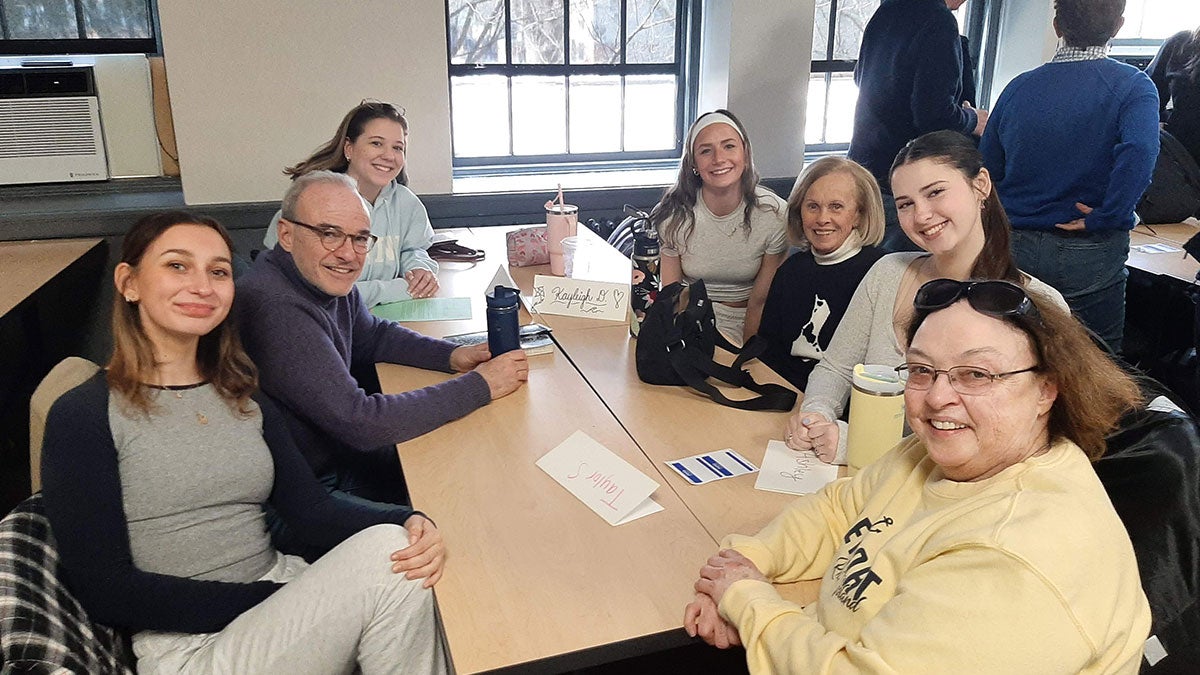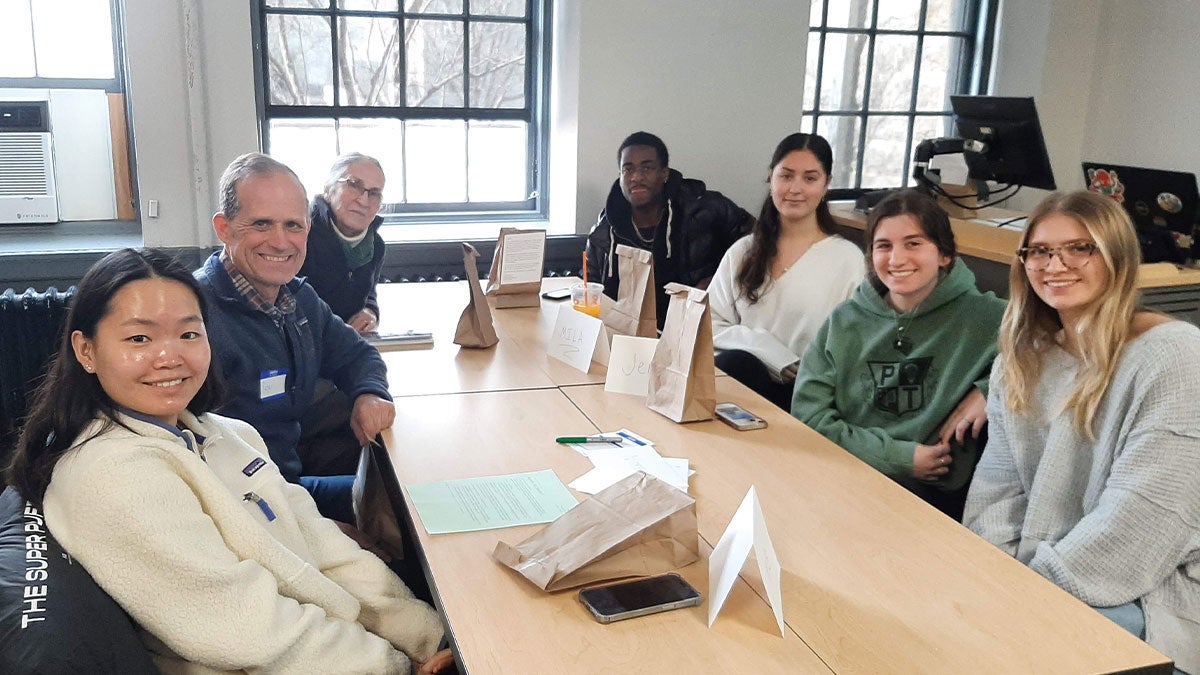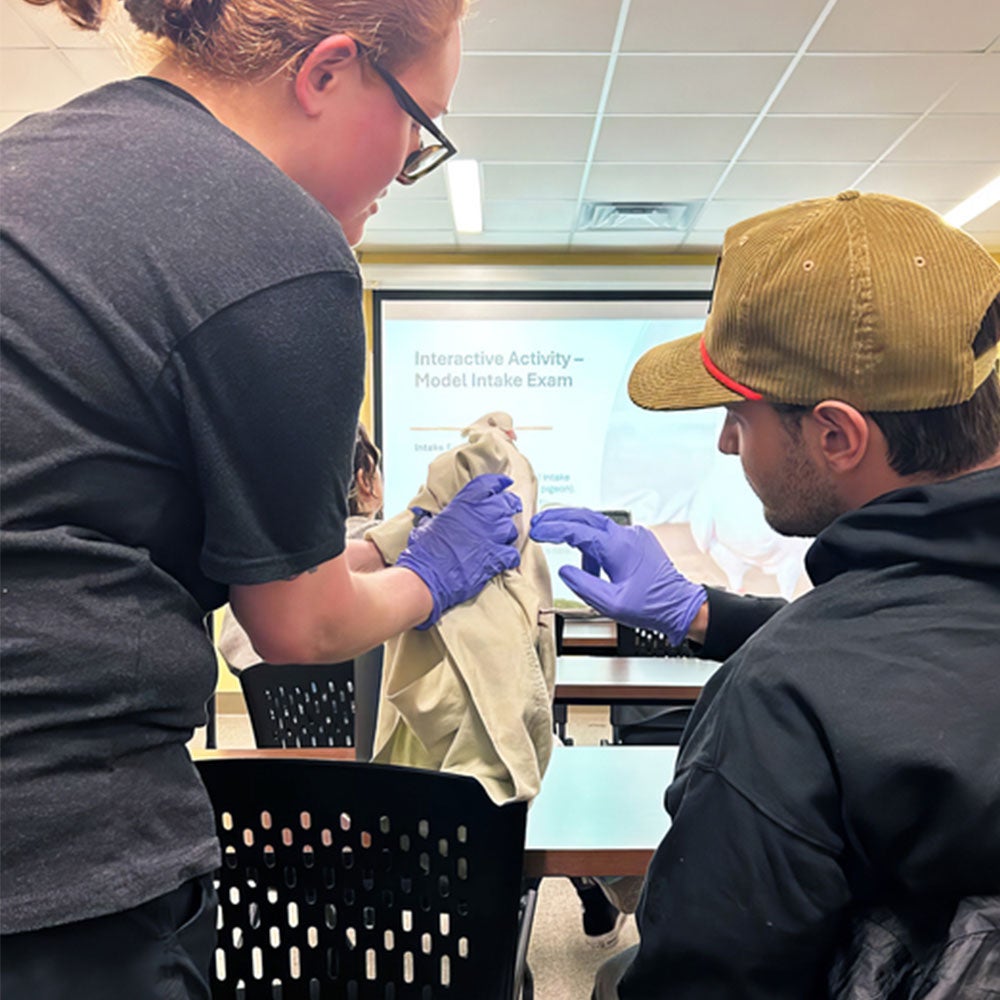Experiential learning offers students unique benefits because it pairs hands-on, real-world experience with the broad, interdisciplinary foundation that the College of Arts and Sciences prioritizes. Participants benefit from a profound understanding through application, stronger critical thinking and problem-solving, personal and professional growth, and preparation for meaningful careers.
The Sociology/Anthropology Department applies these experiential learning opportunities to the core of its curriculum with a personal touch.
“Teaching undergraduates is our priority, and it’s personal,” said Kris Bovy, department chair. “With 13 full-time faculty members in the department, students get to know their professors, and they’ll get to know you. They’re here to help you deepen your experience.”
As future sociologists, students are encouraged to search for the answers to how human behavior is shaped by social structures beyond the level of the individual. This is accomplished in the classroom through research, experiential learning, and fieldwork opportunities.
“Within various classes, you can participate in fieldwork and meet with community members as a built-in part of the class. This program has broadened my worldview and perspective on people around me and the greater society. The support of the faculty is also instrumental in ensuring success among all students in the major,” said student Savannah Beckius ’25.
While fieldwork is an obvious way to get one’s hands dirty, there are courses structured to offer experiential learning within the classroom. Some of those courses include SOC200 Animal Agents of Human Socialization, SOC431 Families and Aging, SOC303 Immersion in Juvenile Social and Legal Justice, and SOC336 Social Inequality. Students who select these courses can access industry professionals, volunteering opportunities, and unique inter-generational connections.
SOC200 Animal Agents of Human Socialization
This course, taught by Professor Judy Van Wyk, explores connections between animals and human socialization from sociological perspectives and how animals are focal points for socialization.
“The course stemmed from my experience working with Ocean Tides (an organization for adjudicated boys) for 23 years. In 2016, I had the idea to encourage the organization to bring pet therapy for the boys. I was credentialed in pet therapy by WindWalker Humane Coalition and started to bring my dog, River (who was trained through the DJ Pet Therapy Program) to the courthouse, Ocean Tides, and Rhode Island training school,” said Van Wyk. “These training courses are now taught through URI by WindWalker.”
Students explore how our bonds with animals bring out the best in us, make us more human, and build community. Think of bird watching, pet shows, agility, fishing, pet therapy, military, guides, and rescues, among many other avenues. Additionally, this course is interdisciplinary as it can attract students from different disciplines like anthropology, veterinary science, communications, psychology, education, and philosophy.
In a recent visit from Volunteer Outreach Coordinator Olivia Harrington of the Wildlife Rehabilitators Association of Rhode Island, students met Raya, a domesticated pigeon that a staff member adopted. Students learned first-hand the importance of the rehab center, the work they do, and the weight that the community holds.
“Community is the lifeblood of our organization,” Harrington said.
By the end of the course, students must engage in at least one experiential activity to identify human socialization patterns related to animals. Some examples include going to the zoo, shadowing a pet therapy class in the community, volunteering for a rescue organization, and horseback riding.
“It’s amazing how little people think about how pets have aided in their accomplishments. Those interactions with animals of any kind have a ripple effect on your day to do life. They do something for us emotionally, even when we’re not making a direct connection with them,” said Van Wyk.
SOC431 Families and Aging
Professor Melanie Brasher teaches Families and Aging, and has extensive experience studying intergenerational relations. Some of her research has focused on children and parents and their interactions as adult relationships.
“In the course, we talk about population aging, but also about inequality as well. This is my fourth year teaching the course, and I’ve always had the intergenerational component. Our OLLI program is a big part of it. OLLI is a nationwide program where typically retired folks, people aged 60+, come to a college campus to take a short course and participate in campus life. So that’s the mechanism through which I’m teaching this,” said Brasher.

For five weeks, OLLI members attend the class. For the first 20 minutes, Brasher gives an interactive lecture. Then, undergraduate and OLLI students participate in discussion groups (topics can range from dating to long-term relationships to divorce, widowhood, and LGBT issues). The groups stay the same to get to know each other. Laptops and cell phones are not allowed.
“There are not many opportunities to interact with somebody not in your family who is significantly older or younger than you are. The OLLI students start to share things that (they) don’t necessarily talk about with (their) own kids. It’s this guided conversation,” said Brasher.
One of Brasher’s goals for the course is for people to stop stereotyping on both ends. The course also provides an excellent opportunity to expand students’ areas of interest. Typically, most students want to work with children. Learning about the aging population gives them room to grow, too. Brasher notes that it is something to consider if one wants to be a social worker.
Student testimonials:
“These OLLI sessions also made me realize that while we have made and seen a lot of changes in society through the years, there is still so much work to be done. Speaking to the OLLI members helped us gain insight into how we can try to start making the changes we want to see because talking to people who have gone through and lived many of these experiences is the best way to learn,” said an undergraduate student, Tierney Milliken.
SOC431 Families and Aging
“We were beaming towards these young people saying, you look so you know, you’re living your values. Or let me encourage you about what you’re choosing for your life, work or following this path, or it’s all going to work out or reassuring them that they’re beautiful and brave,” said OLLI member Marion Freilberg.

SOC303 Immersion in Juvenile Social and Legal Justice
Immersion in Juvenile Social and Legal Justice, also taught by Van Wyk, is a five-week summer course where students meet on the Kingston campus once a week, and one or two days per week on location immersed in the Rhode Island juvenile social and legal agencies. The course covers helping organizations in the state, career opportunities, laws, theories, and processes.
“I’ve been doing my research on juvenile delinquency in Rhode Island for around 24 years. Through my research, I have become very familiar with several non-profit and state funded programs and people. So in 2018, I designed and began teaching this course so that I could take students into these agencies to speak to and directly learn from people who address juvenile delinquency in the state. It is also a great networking opportunity for students. Several past students from the course now work in those agencies and their employment with them stemmed directly from that experiential course!” said Van Wyk.
Students will learn more about the philosophies that underlie rehabilitation and diversionary programs and will hear directly from experts in the field, shadow case workers, teachers, and students; visit with a family court judge, program staff, and past residents; and learn program philosophies directly from the people who design and implement them.
Student testimonials:
“I truly woke up every morning excited to see what the day would bring, and the discussions we would have on each presentation and experience.”
“The forums were all engaging, but it was the time that we spent sharing our feelings about a kid’s situation, or our different perspectives on a particular part of the justice system that was like absorbing another textbook’s worth of information.”
SOC336 Social Inequity
Professor Alana Bibeau’s course Social Inequality is designed for students to gain practice using sociological theory to understand the social world.
“The best way I’ve found to do this is through what I call ‘sociology in action.’ We read four books together – all ethnographies that help us unpack the structures underpinning inequality,” said Bibeau. “One of those books, Evicted by Matthew Desmond, focuses on the U.S. housing crisis. While reading this book, we visit the Sixth Division District Court at the Garrahy Judicial Complex in Providence to conduct our own mini-ethnography of a housing court in Rhode Island.”
Pairing the reading with real-world experiences makes these issues tangible. Until that point, what has been largely theoretical gives them practice using sociology as a tool to ask and answer their own questions. As part of this process, they can observe and interact with a wide range of people, including attorneys, sheriffs, tenants, landlords, social workers, interpreters, and judges. No day is ever the same in housing court. Students learn that their skills matter and can be helpful in the community outside of URI. They leave this experience with a newfound confidence in themselves and their ability to make a difference in their future careers.
“One of the most impactful experiences I had while taking sociology courses at the University of Rhode Island was in my SOC336: Social Inequality course. This experience took place during a field trip to the Garrahy Judicial Complex, where I learned about the housing crisis and the disparities that exist within it. This experience deeply resonated with me, especially because many of the individuals and families facing housing insecurity at the complex were immigrants, just like my parents. As the child of immigrants, seeing these struggles hit home for me in a very personal way. It was a powerful reminder of the challenges that immigrant families face, especially when it comes to securing stable housing, navigating complex legal systems, and dealing with systemic barriers,” recounted an undergraduate student.
Other relevant courses available:
SOC 290: Bridge to the Sociology Major
SOC/APG/GWS 308: Sustainable Agriculture & Food Cultures
APG/HIS 392G: The URI Campus: A Walk through Time
APG/HIS 396: Archaeology Field Course
APG 411: Paleoanthropology
APG 417: Archaeology Method & Theory

